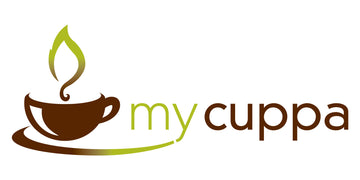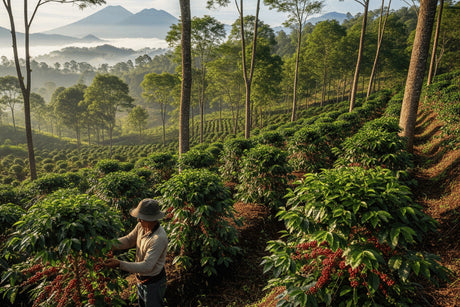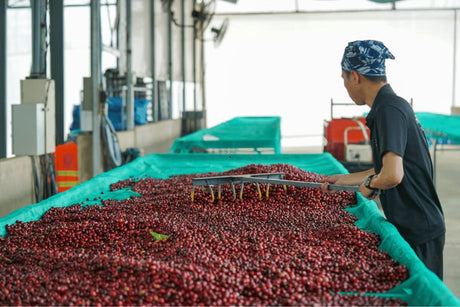Why Your Favourite Organic Coffee is Disappearing in Australia (And What It Means for You)
If you've noticed your favourite organic coffee becoming harder to find and more expensive throughout 2025, you're not alone. As Australian coffee roasters with over 20 years of experience, we've never seen it this tough to source high-quality, raw organic coffee beans.
Prices are at an all-time high, and availability is at an all-time low. This isn't just a small hiccup; it's a significant supply chain crisis. Remember the toilet paper shortages during the early pandemic? That’s the situation we're facing now when sourcing green coffee beans—except there are no hidden stockpiles.
The organic coffee segment has been hit the hardest and is now almost non-existent. Let's break down exactly why this is happening.
The Global Squeeze: Why All Coffee Prices Are Skyrocketing
Global green bean prices hit record highs in 2025, driven by a perfect storm of factors impacting the entire coffee industry.
-
Climate Volatility & Crop Losses: Extreme weather events in key coffee-growing regions have drastically reduced yields for both Arabica and Robusta beans, creating year-to-year unpredictability.
-
Logistics and Transport Bottlenecks: Strained shipping ports, freight markets, and complex logistics have increased transit times and handling costs for green coffee.
-
Market Volatility: Coffee pricing can swing by 20% in a single week. This forces importers to act cautiously, often buying cheaper, lower-quality lots to avoid the risk of being stranded with expensive coffee if the market suddenly drops.
-
Shifting Demand: As commercial buyers pivot toward cheaper origins to manage costs, the competition for the remaining high-quality specialty and certified beans has become intense.
The Organic Dilemma: A Deeper Look at the Shortage
While the entire market is strained, certified organic coffee faces a unique set of challenges that make it particularly scarce.
-
Smaller Supply Pool: Organic-certified coffee is already a fraction of global production. When overall yields fall, these limited lots are the first to disappear.
-
Complex Certification: Achieving organic certification requires multi-year transition periods, extensive paperwork, and costly external audits. This makes it impossible for farmers to quickly scale up production to meet demand.
-
Strict Segregation: Organic beans must be kept separate from conventional beans at every stage—harvest, processing, storage, and shipping. This adds costs and complexity that become prohibitive when logistics are already tight.
-
Evolving Regulations: Shifting organic rules in major markets like Europe and the US add another layer of uncertainty, causing some traders to avoid organic lots altogether until the guidelines and price premiums stabilise.
A Farmer's Perspective: Why It Doesn't Pay to Go Organic (Right Now)
With conventional coffee prices at record highs, many farmers are reluctant to take on the extra burden of organic production.
-
High Upfront Costs: Converting to organic farming requires a multi-year investment in soil health and new practices, often while yields temporarily drop—a tough sell when conventional beans fetch record prices today.
-
Intensive Labour: Organic systems demand more hands-on management for pruning, soil care, and processing, which increases labour costs.
-
Market Risk Aversion: Farmers can maximise their revenue right now with conventional coffee. Accepting the uncertain future premiums for organic lots is a financial risk many can't afford to take.
-
Uneven Premium Capture: After traders, processors, and certifiers take their cut, many smallholder farmers see little of the final organic price premium, reducing the incentive to do the extra work.
The Ripple Effect: From Roaster to Your Morning Cup
This scarcity has direct consequences for everyone who loves a quality cup of coffee.
-
For Roasters: We are forced to pay much higher premiums, limit our organic offerings, or search for non-certified alternatives for our blends. For single-origin organic coffees, there is simply no substitute.
-
For Retailers: Coffee shops and retailers face narrower margins, complicating menu pricing and making it harder to offer consistent, affordable organic options.
-
For Consumers: Ultimately, the consumer faces higher prices, less variety, and the potential disappearance of their favourite single-origin organic coffees from the shelf.
What This Means for Organic Coffee at myCuppa
At myCuppa, we are committed to sourcing the best organic lots we can find. However, we cannot buy the same volumes or varieties as in previous seasons. This is a deep concern, and it's why we've had to limit the sale of our organic coffees for the short term.
Inevitably, some of our Organic Single Origin offerings may temporarily disappear until the supply chain improves. A few have already been removed, and we expect more will be out of stock by the end of 2025.
We know how important this coffee is to our customers, and we are working tirelessly to find trading options. While the market is cyclical, the current trend of rising prices and scarcity presents a challenge unlike any we've seen before. We appreciate your understanding as we navigate this difficult period.









